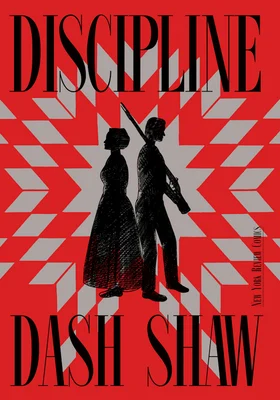[I arrogantly recommend… is a monthly column of small press and books-in-translation reviews by our friend, bibliophile, and retired pavement inspector Tom Bowden, who tells us, ‘This platform allows me to exponentially increase the number of people reached who have no use for such things.’
Reviewed books can be purchased direct from Book Beat by stopping by, emailing bookbeatorders@gmail.com or calling us at: (248)-968-1190. The book title links are provided to our Bookshop.org affiliate page for out-of-town readers and mail-orders. Book Beat will be credited with 30% of the sale from Bookshop links and 10% of the sale will be shared with indie bookstores nationwide. Thank you for your support! Read past reviews at: I arrogantly recommend… by Tom Bowden.]
 Against Amazon and Other Essays
Against Amazon and Other Essays
Jorge Carrión (Peter Bush, trans.)
Biblioasis
Spanish essayist Jorge Carrión lists a mere seven reasons readers should avoid buying from the behemoth Amazon, but the best arguments in this collection are those supporting libraries and independent bookstores. One point against Amazon that Carrión misses (had we but world enough and time to explore all of them!) is its famous algorithm that reduces purchases to “if you like that, you might also like this.” If, like me, you prefer books in translation published by small, indie presses, Amazon will not refer you to similar publishers and books but to mega publishers and their mediocre treacle. Stated positively—which the majority of this book does exceedingly well—bookstores and libraries can provide human- and community-based discussions and exchanges of ideas.
Japan, for instance, now has a handful of bookstores that charge entry fees (about $13), which are refunded with purchases of equal or higher value. Experts in various fields (“concierges”) provide individualized recommendations for customers seeking such help. The best bookstores avoid trying to be all things to all people, and instead focus on a handful of areas. As a result, the best bookstores are not necessarily those with the largest inventories.
Waxing poetic along with Carrión about the joys of new and used bookstores are writers Alberto Manguel, Iain Sinclair, Han Kang, and others interviewed, less for insights into the books they have written than for their unstinting drive to seek and read interesting and unusual works, and where they find them. In his capacity as Director of the National Library of Argentina, Alberto Manguel reveals a life that is far from leisurely:
“I’ve just reached seventy, and physically I feel I don’t have the energy to carry on for much longer, because this is a job that requires a mental and physical presence from early to late. I am in the library from 6:30 a.m., and what with official dinners and all the rest, I don’t go to bed until midnight. Seven days a week, with all the traveling and constant problems; I mean, a library isn’t a place where you only do one thing. Every quarter of an hour I have to solve a problem, related to electrical fittings, the purchase of books, customs red tape, trade-union issues, personal problems, there are 850 employees, a sick child, a divorce, the design of an exhibition, administrative matters, lectures, workshops, digitalization, in short. . . Every quarter of an hour there’s a different problem, and although I have a wonderful team, it is exhausting.”
That’s just one rabbit-hole of surprising information found on almost every page of this book. The amount of writing and publishing in Spanish in the U.S. shocked me, and I both rue and take solace in the fact that my monolingualism deters my own library from expanding even further, which already flows outside of my house. Recommended for book lovers everywhere.
[ Watch a virtual book launch hosted by the publisher of Against Amazon and Other Essays: Biblioasis. This video includes a discussion with several Canadian and USA booksellers, and a prerecorded statement by the author Jorge Cassión at about the 19 minute mark. View on Youtube here: https://www.youtube.com/watch?v=4jaJI4k5Juo]
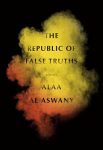 The Republic of False Truths
The Republic of False Truths
Alaa Al Aswany (S. R. Fellowes, trans.)
Knopf
Beginning on the eve of the Tahrir Square uprising during Egypt’s winter 2011, The Republic of False Truths relates a Dickensian tale of the events from the points of view of members of all societal levels, men and women, Muslims and Copts, orally and in writing, for and against the uprising, and those who must be shocked into choosing sides from their positions of cynical ironic distance. For all the novel’s characters, religious ideals form the basis for the rationales of their moral decisions. At stake is the significant difference between the letter and the spirit of the law, the former prone to opportunistic hypocrisy and corruption, the latter open to discussion and collaboration.
Ten years on and it’s clear that politically, things are back to the Mubarak status quo. The Republic of False Truths suggests that options for the Tahrir revolutionaries are exile, vengeance, or apathy. The book is filled with hope, despite the atrocities committed by the Egyptian government against its own people, and anger—aimed as much at the apathetic Egyptian majority as at Mubarak’s regime. Those who stay and those who remain have equally compelling reasons for their actions, and no easy answer to expelling the systemic rot that leaves so many of Aswany’s protagonists anguished.
Ulrich Alexander Boschwitz (Philip Boehm, trans.
Metropolitan Books
Begun the day after Kristalnacht and finished four weeks later, The Passenger is both an impassioned response to Germany’s assault on its Jewish citizens and a prescient observation on what was to come, following the Nazi government’s agenda to its logical conclusion, well before it was implemented with ruthless efficiency.
The novel’s protagonist, Otto Silberman, is a well-to-do tradesman married to a Christian, living a secular life. Adding to Silberman’s good fortune at the novel’s outset is his lack of physical traits seen as stereotypically Jewish. But as the book begins, his negotiations quickly go south with a man he has worked with before, but for whom the current nationwide hostilities toward Jews has encouraged to negotiate in terms of pfennigs on the mark. That deal is interrupted when the police arrive, and Otto is forced to go on the lam out the back door.
Separated from his family (his son lives in Paris, his wife escapes to live with her Nazi brother), Otto spends most of the book (in ominous prescience) travelling around Germany on trains for three days, looking for a way out of the country, only to find closed off every avenue of escape. While his trip shows him that not every non-Jew is complacent with the Nazi regime, he quickly discovers even in himself an abhorrence toward fellow Jews who now suddenly seem obvious, drawing attention to themselves, and clingy. (See Cynthia Ozick’s The Shawl, written decades later, about this.)
Without money, exhausted from his non-stop travels, lack of sleep and decent food, Silberman tries suicide by cop without success. For that, he will need the help of his fellow Germans.
Dash Shaw
NYR Comics
Charles is a 17-year-old Quaker at the outset of this novel of the Civil War. For Charles, and a minority of other Quakers, some social ills are too appalling to turn the other cheek—mere tutting will not free or repatriate those Africans stolen from their homes, abused, and forced into dehumanizing labor. Rather than the color-coded plot elements of his earlier graphic novels, Dash Shaw’s Discipline relies on spare black lines on white pages, absent of panels but visually moving akin to eyes arcing across a path of movement, focusing on key elements of place and movement. In a recent interview in Bubbles #11, Shaw says the simplicity of this approach aims to replicate the meditative silence pervading weekly Quaker meetings. (The Bubbles interview also provides more insight into Discipline’s creation and includes 10 pages of images that didn’t make the final edit.)
Little dialogue and few excerpts from postal letters provide the verbal narrative of this researched work (upon which the written words are based), but the main story is this: Oldest child and only son feels morally compelled to join the Union army, breaking his mother’s heart and dividing the local Quaker community as to the morality of his actions. Charles sees action; is wounded, interned as a POW, rescued, and eventually returned home, a changed young man to an ambivalent community.
Watch the NYRB book launch for Discipline at: https://www.youtube.com/watch?v=3YNipOYTy88 Below is a video profile on Dash Shaw by the New Yorker:
 Every Child Is Beautiful When Born: Selected Poems
Every Child Is Beautiful When Born: Selected Poems
Esad Babacic (Andrej Pleterski, trans.)
Dalkey Archive
This well-arranged (as opposed to chronological) sequence of poems from across decades of Babacic’s (b. 1965) published works in Slovenia marks the poet’s first anthology published in English, highlighting themes that have remained consistent obsessions over time.
The shorter pieces are epigramic, usually only a single sentence/ stanza, often beginning with the phrase “Sometimes you,” such as the Bukowski-like “Sometimes you go all the way / even if you’ve lost your way” and “Sometimes / you clench / the fist / in which / you’d bring / flowers.” (Cf. Bukowski’s “You Get So Alone at Times That It Just Makes Sense.”)
The topics often cover some variation on the theme of alienation from a culture that embraces faceless, mechanical impersonalism in exchange for access to cash. For instance, “A Green Land” begins like this: “There’s a manic / depression of economy, / a psychosis of taking away / heartlessly, / a manic depression / of constructive engineering, / a depression of graves / never in short supply.” The opening to “The Body Scent” reads like an Eastern European cross between Rainier Fassbinder and Simon Hanselmann’s Megg and Owl: “The sun has risen above the Golovec and breathed through / my room. / The state would call it the sun of freedom. With slow and / drowsy gestures / I crawl toward my pants, thinking whether I should eat today / or get fucked-up.”
Baba?i? writes the kind of poetry people who usually don’t like poetry like: The words are familiar, the images direct and concrete, and writer’s life is also one in which diligence and decency have few rewards.
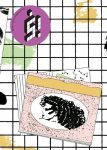 š! Baltic Comics Book #43: Queer Power
š! Baltic Comics Book #43: Queer Power
Various artists
Grafiskie stasti
From Latvia comes š! , a quarterly anthology of themed works from cartoonists around the world. The latest issue, on Queer Power, includes works by 20 artists from Lebanon, Canada, the US, Latvia (of course!), Portugal, China, Slovenia, Russia, Argentina, and elsewhere, expressing the varieties of living queer in the world. The artistic styles are as varied as the geographic origins. Love, infatuation, self-doubt, gaining courage, reality, fantasy and more are crammed into the book’s 160 pages and 4” x 6” format.
The š! anthologies can be difficult to find in the U.S. but ordering direct from the publisher is as cheap as buying in the U.S., including postage. Plus, you can subscribe to the quarterly and the mini-š! series (also well-worth a future review) at rates that I’m guessing must be subsidized by the Latvian government, given how much postage from other European countries can cost.
 Short Dog: Cab Driver Stories from the L.A. Streets
Short Dog: Cab Driver Stories from the L.A. Streets
Dan Fante
Black Sparrow Press
Dan Fante’s story narrators are bullshitters—drunks who pass the time between sips telling expletive-filled tales of debauchery, drugs, and drinks: scamming detox programs and taxi fares, lying to lovers, issuing threats, raising cane, and so forth—the whole race-to-the-bottom scene. Like his father John’s friend, Charles Bukowski, Fante’s narrators are also closeted men of culture: articulate, well-read, having a sense of good taste but also a taste for self-destruction. (Fante, unlike his father and grandfather, eventually dried out for good.)
In Short Dog, these fictionalized exploits include encounters with a malicious doorman of a swanky hotel; a relationship with a woman whose on-again, off-again nature reflects when the narrator is in or out of detox programs; befriending a pair of addicts who own a boa constrictor, whose needs are more difficult to fulfill than their own; rolling drunks and getting STDs; and so much more, living down-and-out in L.A. The stories make for fun reading, mainly because they’re read from a safely hygienic distance.
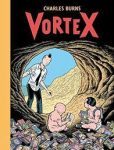 Vortex
Vortex
Dédales 1 & 2
Charles Burns
Cornélius
The three books under review are collateral matter from Burns’s “toxic trilogy” (cf. Sugar Skull, The Hive, and X’ed Out) and the first two installments of a new series, all available through the French publisher Cornélius (who apparently has no American distributor).
![]() Although Burns is American, the dialogue that provides the verbal narrative of Dédales 1 & 2 has all been translated into French, so be warned. (I haven’t tried Google Translate yet, but just relied on what I could make out based on the illustrations.) As is often the case in stories by Burns, a handsome but gawky teenage boy meets a beautiful, knowing teenage girl, this time to together confront a floating brain with tentacles and the cocoons it drops. (References to The Invasion of the Body Snatchers is deliberate.) The book is replete with references to ‘50s B-list horror and science fiction films.
Although Burns is American, the dialogue that provides the verbal narrative of Dédales 1 & 2 has all been translated into French, so be warned. (I haven’t tried Google Translate yet, but just relied on what I could make out based on the illustrations.) As is often the case in stories by Burns, a handsome but gawky teenage boy meets a beautiful, knowing teenage girl, this time to together confront a floating brain with tentacles and the cocoons it drops. (References to The Invasion of the Body Snatchers is deliberate.) The book is replete with references to ‘50s B-list horror and science fiction films.
Vortex collects side work inspired by and tangentially related to the “toxic trilogy,” in which Burns typically joins his dead-pan realism to manifestations of dread, horror, and confusion. Imaginary magazines, titled and illustrated, and dialogue (what little dialogue there is) alternate between alien calligraphy and English)—the action is the point, not the words, and the result is like a colorized B-monster film from the ’50s.
 Motley Stones
Motley Stones
Adlabert Stifter (Isabel Fargo Cole, trans.)
NYRB Classics
The narrators of these stories—the motley stones—are several generations removed from their tales, provided as descriptions of persons of remarkable character. Written in the mid-1800s, Stifter’s tales occur probably around the turn of the 18th century, when Germanic nations were primarily rural, and even the biggest cities were modestly sized by today’s standards. Although the natural world is lavishly described throughout, with eyes and insight worthy of Thoreau, Stifter is primarily interested in inflexible eccentricities. Stifter’s narrators clearly admire these people while also acknowledging that some readers may find them mere fools, while others—like the narrators—are marked for life by the encounters.
One such example is the nameless, ascetic parson in the story “Limestone.” (Spoiler alert!) The parson has a secret cause he’s been stowing away money for—to build, for safety reasons, a new school for the local children. For decades he scrimps and sacrifices, living just above beggary level. Late in the story, after he dies and his will is read, his bequest to the community is revealed—as is the fact that his 30+ years of savings isn’t nearly enough to cover costs. The well-to-do in the area rise to the occasion and raise the funds necessary to fulfill the requirements of the parson’s will.
Stifter does, or did, have his detractors for his attention to small people of small significance. And I can imagine them saying about “Limestone,” “Good lord. Generations of parents risked their children drowning to reach school during deluges on the floodplain. And even though the area had been settled for centuries, it wasn’t until an outsider to the community—the parson—noticed a much safer location for the school already existed—but he didn’t say a word about it until after his death. Who are these people?”
But its Stifter’s attention to minutiae that makes his writing fascinating, so that 50-page story about a boy punished for walking in the house with greased feet becomes a compelling meditation on geography, landscape, history, and human relationships in small communities. Even if we don’t understand a character’s motivation (Why does a cuckolded husband take his daughter and leave a community after his wife has run away? Why does he resign them to a life of poverty, living in the basement of a dilapidated apartment building?), the reactions these characters elicit in the other characters often brings out the best in human compassion. Stifter may be an idealist—not for acting as if the world is nothing but pureness and light—but for insisting there is more inherent good than evil in the world, and that goodness eventually irons out the bad.
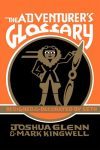 The Adventurer’s Glossary
The Adventurer’s Glossary
Joshua Glenn & Mark Kingwell
Designed and decorated by Seth
McGill-Queen’s University Press
Why does adventure give meaning to life? Because, among other things, it alleviates or even obliterates daily life’s routine and lurking tedium. . . All adventures, large and small, and driven by desires: for secrecy, wealth and power, political success, military advantage, survival, or the simple pleasure of beating the game or opponent. . . Adventure is challenge and reward, risk and redemption. It doesn’t have to be physical or violent.
—Mark Kingwell, in “To the Golden Land!”, the book’s introduction
Over the past 14 years or so, I’ve come to look forward to a new glossary from the trio of Glenn, Kingwell, and Seth. Beginning in 2008 with The Idler’s Glossary, followed three years later with The Wage Slave’s Glossary, Glenn, Kingwell, and Seth have taken on projects in which “consulting semiotician” Glenn and professor of philosophy Kingwell examine and assess key words from subcultures for the words’ meaning, origin, and social significance: in short, what the idler’s, wage slave’s, and now adventurer’s word choices say about their (and our) world views. Seth’s “decorations” (not “illustrations”) humorously embody in single images the character of the words defined.
In The Adventurer’s Glossary, Glenn and company tackle familiar and unfamiliar terms (e.g., “challenge,” “skin of one’s teeth,” and “fubar” vs. “sisu,” “see the elephant,” and “cwitch”). The glossary is about three times the size of their previous glossaries, although I’m sure all of us could think of an adventurous word or two the current edition overlooks. Let the following explanation of “scot-free” serve as a typical example:
To get away with doing something illicit scot-free is to do so without punishment or injury. Although the sixteenth-century phrase once meant “not required to pay scot (i.e., taxes, tariffs), today’s usage is an alteration of shot-free—meaning, literally, “without getting oneself shot.” As Falstaff laments in Henry IV, pt. 1, when he finds himself transported from a London tavern to a great battle at Shrewbury: ‘Though I could ‘scape shot-free at London, I fear the shot here.’
Of importance equal to the glossary and decorations are the introductory and concluding essays. Kingwell’s introduction (“To the Golden Land!”) summarizes the trio’s previous work, the motivations and goals behind the current project, and the resulting word choices. Glenn’s “A Typology of Adventure” summarizes the major forms of adventures and their variations, along with examples from popular and classical culture and a chart of adventure typology at the essay’s end.
Recommended for anybody who enjoys the backstory behind words or the socio-cultural significance of what people say and write.
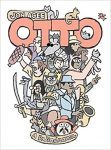 Otto: A Palindrama
Otto: A Palindrama
Jon Agee
Dial Books
Aimed at kids 9-12, Otto recounts the titular hero’s adventures on the beach, forest, and town as he loses then finds again his parents. Palindromes are words, phrases, and even sentences that are the same spelled backwards as they are forwards. Hence, characters like Reg Gabler, Apparel Bagger, and sentences like “Go hang a salami! I’m a lasagna hog!” The illustrations are fun and made of simple, bold lines. The tween years are a good time to introduce kids to palindromes: they know enough about spelling, grammar, and sentence structure to appreciate palindromic patterns and the challenge in writing palindromes that also make a reasonable amount of sense.
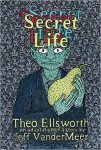 Secret Life
Secret Life
Theo Ellsworth and Jeff VanderMeer
Drawn & Quarterly
A dystopian reminder that entropy is a stronger force than order and that—try as humanity might to tame, poison, or eliminate what it doesn’t like—nature will triumph over our pewling efforts to subdue it. Ellsworth’s hyper-detailed drawings imbue Secret Life with the claustrophobia deserving of settings consisting of a building, its rooms, cubicles, and ductwork. In the enormous building—where work and life are barely separated—different self-generating castes evolve for those living on different floors, each at odds with the others. The rationality of human endeavors prohibits recognition of its inherent inanity, courtesy of unexamined bureaucratic assumptions informing its definition. How can nature not triumph?


